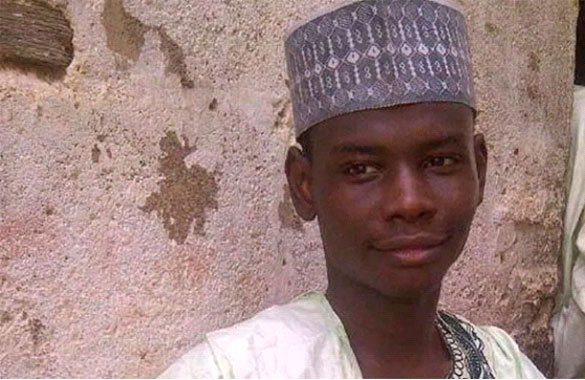The Nigerian Blasphemy Case Is another Reminder That Sharia Law Needs To Go

By Arshad Alam, New Age Islam
01 October 2020
A thirteen year old child has been
sentenced to ten years of imprisonment in Nigeria. The state of Kano is one of
the twelve states in the country where sharia law is applicable. The court did
not take long to convict this child of blasphemy, a ‘crime’ which relies on
witness testimonies to prove its case. In this case, the boy allegedly made
uncomplimentary remarks about Allah, during an altercation with fellow teens.

Sharia
Court in Nigeria sentenced Yahaya Sharif-Aminu to death by hanging for
blasphemy (Image: Bolognanotizie)
----
It is a relief to know that sharia
court judgments in Nigeria can be challenged in the secular courts which might
give some relief to the concerned boy, who faces and uncertain and bleak
future. It is also a relief to know that his case is being appealed in the
higher secular courts of that country. Yet, anyone accused of blasphemy,
despite his acquittal, is condemned to lead a precarious existence, hiding his
identity and forced to live in fear his whole life. Even in the case of Asia
Bibi of Pakistan, the threat to her was so much that she had to leave the
country. One can only hope that this Nigerian teen will be freed by the secular
courts and will be allowed to live a normal life afterwards.
The whole point of modern law is
restitution; the idea that people have an innate capacity to reform themselves
and can return to participate fully in society after his or her sentencing.
Islamic law doesn’t operate on such a principle; it is punitive and repressive.
The basic assumption here is that people cannot be reformed, that certain
attitudes are permanent and that they must be punished swiftly and in a manner
that they do not repeat the same mistake again. Everywhere, feudal laws were
repressive but the world has since moved on. The same cannot be said about many
parts of the Islamic world where such laws still prevail. The argument that it
is God’s law and hence cannot be changed is bogus to say the least, but so
powerful that if anyone speaks against it, then one becomes the enemy of the
state.
The sentencing has made
international news, not only because it is harsh but also because people are
aghast to realise that even children are not outside the purview of this
ghastly law. UNICEF has harshly criticised the judgment and called upon the
Nigerian state to restore the dignity and normality of the child in question.
Many, including the director of Auschwitz, have volunteered to serve jail time
in place of the convicted child. Many in the Muslim world have expressed
extreme displeasure over such a sentencing and have called on the Nigerian
authorities to show mercy to the child, arguing that mercy is one of the important
virtues in Islam.
One sincerely hopes that some good
will come out of all these interventions and that the child will not face
ruination of his future. At the same time, one cannot help but realise that all
such requests and petitions are not asking fundamental questions which led to
the incarceration of the boy in the first place.
The extant Islamic law does not
agree with the definition of a child that the modern legal system adheres to.
Whereas in the modern law, the definable age for children is below 16-18 years,
Islamic legal position does not have a set age to define what constitutes a
child. It operates with the concept of baligh/mature and identifies this
maturity with certain physical changes in boys like the appearance of facial
hair, etc. Thus puberty in Islamic law is conflated with maturity and
responsibility, although world over, puberty is understood as the time when the
child is faced with veritable emotional instability. The onset of puberty can
and does vary for each individual, although both the Hanafi and Shafi
jurisprudence argue that it can start anytime from twelve lunar years (11.6
years). So if a child has crossed this age and the Islamic judge is satisfied
with its verification, then he has no other option but to try the child as an
adult. This is what seems to have happened in the Nigerian case: the boy in
question is 13 years old and therefore according to Islamic law is fit to be
tried as an adult. There is no point in running the judge down because he is
absolutely correct within the framework of legality in which he is operating.
Not just judges but even Islamic
terrorists subscribe to the understanding that with the onset of puberty, he or
she should be treated as an adult. The Tahreek e Taliban of Pakistan, after
massacring hundreds of school children in Peshawar, announced to the whole
world that they took ‘ample precaution’ by not targeting pre-puberty children.
Those who had any facial growth were segregated as fair game, to be killed
without any moral compunction. It trying to legitimise the killings, they were
also telling the world that they had killed within the legal parameters set by
Islam.
Muslims and others who are aghast at
the sentencing of this Nigerian teen must understand that the problem is not
with that particular country or the judge; the problem is with the dominant
reading of Islam which legitimises such legal action. Islamic law has become a
relic which needs to change and until that happens, no matter how much we keep
bemoaning the fate of this child, such convictions will keep happening
routinely.
----
Arshad Alam is a columnist with NewAgeIslam.com
URL: https://newageislam.com/islamic-sharia-laws/the-nigerian-blasphemy-case-another/d/123010
New Age
Islam, Islam
Online, Islamic
Website, African Muslim News, Arab World News, South Asia News, Indian Muslim News, World Muslim News, Women in
Islam, Islamic Feminism, Arab Women, Women In
Arab, Islamophobia in America, Muslim
Women in West, Islam Women and Feminism
